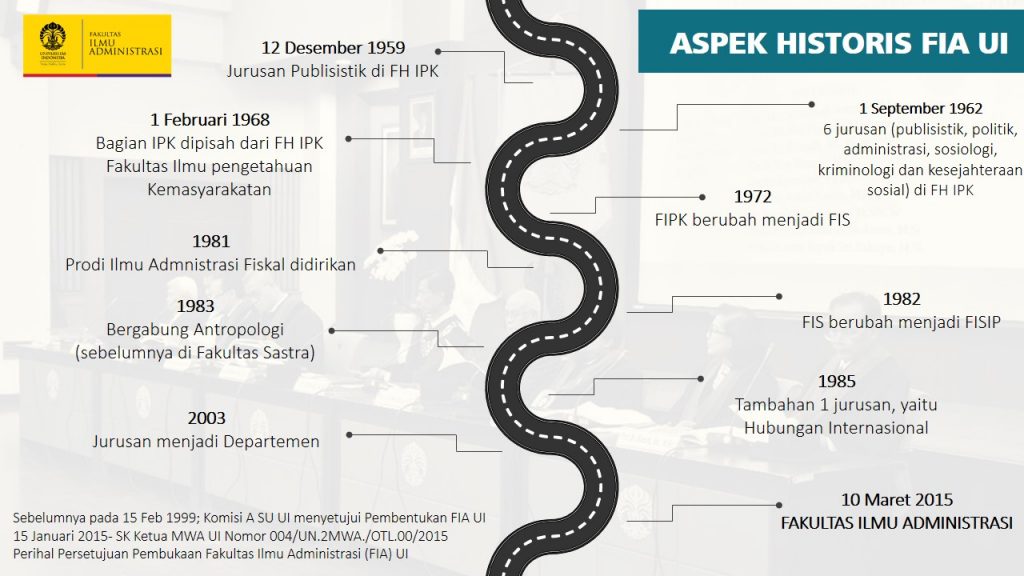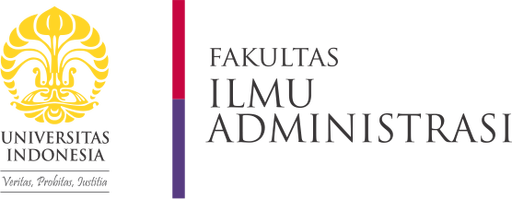
Historical Aspect
The Faculty of Administrative Science, Universitas Indonesia (FIA UI) was originally a Department of Administrative Science, under the Faculty of Social and Political Sciences, University of Indonesia (FISIP UI).
In March 2015, FIA UI was established as a new faculty at Universitas Indonesia. At the moment, FIA UI has three departments namely 1) Department of Public Administration, 2) Department of Fiscal Administration, and 3) Department of Governance of Commerce, and one Postgraduate Program in Administrative Science.
The three departments run undergraduate program, meanwhile the postgraduate program runs master program, double master degree program, and doctoral program.
Administrative Science is the core field of study of organizations and policies that do not view private and public organizations as a black box. In this regard, Administrative Science examines the internal dynamics of private and public organizations as the main instruments for solving social problems as important as market mechanisms, altruism, and positive anarchy. The scope of the Study of Administrative Science, in addition to the internal dynamics of private organizations in relation to the production and distribution of private goods and services, also includes the internal dynamics of public organizations in relation to the production and consumption of public goods and services as well as external factors influencing the dynamics of these two organizations. These external factors may be politics, social and culture, law, technology, information and other global developments. It allows Administrative Science to grow into a scientific discipline that, in spite of interdisciplinary in nature, has an area and method of study that is independent and parallel to other disciplines of social science.
The characteristic that distinguishes the profiles of undergraduate and postgraduate graduates of the Faculty of Administrative Science Universitas Indonesia from other faculties is the capability to compile and analyze policies at the macro, meso and micro levels of an organization. The demands of public and private organizations for increasing organizational competitiveness are the needs that must be met by universities.
In addition, the relations between the public sector (government) and the private sector become closer, hence the need for deep understanding between the disciplines of public administration and business administration. For example, the scientific progress of new public management that adopts the application of the principles of private sector governance in the public sector leads to the loss of barriers between the two disciplines. The application of this context, for instance, is the policy of the Government of the Republic of Indonesia on Bureaucracy Reform (RB) agenda. One of the RB programs is changing various recruitment and selection mechanisms with merit system, Results-Based Performance Assessment, and Provision of Remuneration based on work performance.
Relations between the two sectors are increasingly strengthened by the science of fiscal administration. Fiscal administration will bridge the need for the process of formulating strategies for funding and expenditure policy for both public and private organizations as well as the regulations affecting the relations between public and private sector.
The dynamics of environmental changes such as globalization, emerging market economy, massive development of information technology, become other variables that must be considered by an organization to be able to guarantee its sustainability and competitiveness at national, regional, and international levels. This situation is also another distinguishing characteristic of the Faculty of Administrative Science from other faculties. Graduates of the Faculty of Administrative Science are expected to be able to elaborate on these various dynamics as well as provide analysis and synthesis that are the basis for making organizational policies and decisions.
Commitment
Sincerity to carry out tasks responsibly in a way that is based on cooperation and mutual respect
Integrity
Consistency between actions and principles outlined by the organization, honesty, and promote shared interests
Transformative
Open minded, encourage innovation, adaptive, and innovative
Accountability
Firm and trustworthy given by the organization, be served, and care
VISION
To become a center for the development of excellence in administrative science, policy study, and strategic governance based on Three Pillars (Tri Dharma) of Higher Education in Southeast Asia
MISSION
1) To organize competitive and dignified higher education in administrative science, policy study, and strategic governance; 2) To conduct research in administrative science, policy study, and strategic governance for scientific development and the progress of the nation; 3) To perform community service for the benefit of the nation; 4) To produce graduates who have administrative competence with an inter- and multi-disciplinary approach and ability to compete in the international level based on the highest standard of integrity.
GOAL
1) To produce graduates who master the theory and methodology as well as apply administrative science and policy study and are able to interpret government macro policies, inter-organizational meso policies, and intra-organizational macro policies in an integrated system order. 2) To produce quality research in the field of Administrative Science and policy study and develop administrative concepts and theories. 3) To perform community service in the field of Administrative Science and policy study.
